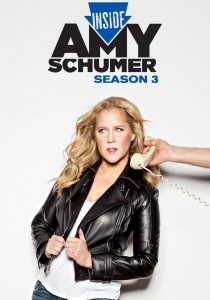 By most measures Amy Schumer is an unlikely It Girl. She is crude and often vulgar. She does not look like or present herself as a vapid, bleached-blond wastrel. She speaks bluntly and frankly about the very system that regularly anoints It Girls, and what she has to say is sharply critical. And yet here we are: Amy Schumer is nominated for an Emmy, is the star of a hit movie, and is a least a weekly headline item. It should go without saying that this is a vastly preferable world, and that it is Amy Schumer's own body of work that has made her success possible.
By most measures Amy Schumer is an unlikely It Girl. She is crude and often vulgar. She does not look like or present herself as a vapid, bleached-blond wastrel. She speaks bluntly and frankly about the very system that regularly anoints It Girls, and what she has to say is sharply critical. And yet here we are: Amy Schumer is nominated for an Emmy, is the star of a hit movie, and is a least a weekly headline item. It should go without saying that this is a vastly preferable world, and that it is Amy Schumer's own body of work that has made her success possible.
Inside Amy Schumer presents its third season for Emmy consideration this year, but this is the first season to truly become such a hot topic of conversation. Schumer's ascent into the public eye has been nothing shot of meteoric. In fact you can begin to see the backlash phase beginning; pick any comments section on an article about Schumer and you will find at least one comment complaining about the superfluity of articles about Schumer. You don't need me to tell you that this backlash is largely imagined, the result of the collective undesirables of the Internet-with-a-capital-I, replete with neckbeards and MRA-pamphlets, finding fault with Schumer's particular brand of feminism.
These neckbeards are Schumer's bread and butter. Inside Amy is nominated for Outstanding Variety Series (though really, should not these shows be eligible to compete in the “real” comedy category?), but one need only focus on the episodes and sketches singled out for the show's other six (!) nominations to see exactly what Schumer's project is, and where she plumbs society's less fortunate aspects for maximum comedic effect.
Take “Cool With It”, which of the three episodes highlighted by the Television Academy plays things the most straight. In the titular sketch, Amy plays an office worker determined to play it cool with her office-bro co-workers. They go out to a strip club, get drunk, get lap dances, all to Amy's repeated, increasingly garbled refrain that she's “cool with it!” Things escalate until Amy is murdering the stripper and burying the body—still cool with it. The sketch ends with a non-sequitur; Amy turns to the camera and pitches equal pay for women. Then she bashes the still-breathing stripper over the head with her shovel.
It's easy to see why the sketch appeals to Emmy votes, and why this episode is the one for which Amy is recognized as an actress. On display is her determinedness to weave current social issues into her comedy, but to do so in challenging and unexpected ways. Here the issue is not just equal pay—in fact that is shoehorned in rather weakly—but also the issues that women face in the office and in other social situations. They are expected to conform to such dudebro behavior—think of Gillian Flynn's “Cool Girl” for this concept taken to its dramatic extreme. Schumer satirizes it expertly, but what is also on display here is her gameness to use her own physicality in service of the satire. Schumer's leans into her physicality, not afraid to play a silly, drunken slob. Physical comedy is a huge part of what makes these sketches work, and Schumer's versatility is showcased here.
That Schumer is not afraid to sound drunk, look silly, or go blue is half of her success recipe. The other half is her braininess, and that of her writing team, all of whom are also recognized for an award this year. Again, the individual episodes recognized are clues into what Emmy voters have rightly recognized in the show as a whole. Nominated for Outstanding Original Music is Girl You Don't Need Makeup, the One Direction parody that also features in “Cool With It.” The song is first and foremost a quality pop track, which isn't exactly required, but it certainly helps; the production is so top-notch, this could easily be a real One Direction song.

The music and lyrics are by staff writer Kyle Dunnigan, and they are, at first, a straight parody of “You Don't Know You're Beautiful”, with the same “you're naturally beautiful!” message, only infinitely more obtuse. (Sample lyric : You're beautiful and who cares what they think / Now wash that lovely face off in the sink / In the sink, girl.) But things very quickly take a turn for the absurd, a trademark of many of Schumer's best sketches; the satire begins obviously, but then is turned on its head. After the first chorus, the boy band exhorts Amy to “hold up, girl / we spoke too soon / with this whole no makeup tune / we kinda changed our minds on the makeup thing.” Now they're extolling the virtues not of makeup, but of the way makeup can make a girl look like a “naturally beautiful girl.” “You'll be the hottest girl in the nation / with just a touch of foundation” and “I didn't realize that your lashes were so stubby and pale / Just a little mascara and you'll look female” drive home the point, and before long the chorus has been revised as well. Amy is still perfect when she wakes up, “just don't go outside like that, OK? / just a little makeup, some natural-looking makeup / what more do I have to say?” By the end of the song Amy is made up like a clown. Here again is that perfect marriage of verisimilitude, satire and absurdity.
That braininess extends to the other two episodes singled out for Emmy recognition. In the first, “Last Fuckable Day,” the titular sketch features Julia Louis-Dreyfus, Tina Fey, and Patricia Arquette, who are celebrating Julia's last fuckable today. The thesis is that women in Hollywood reach an arbitrary point at which they are no longer fuckable, and there's nothing to be done about it. The sketch treats this not just as a tremendous injustice, but as an insurmountable fact. Throughout, the actresses lean into and even celebrate it; now they can eat whatever they want, and fart and belch freely. Unlike many of the other sketches this season, any sort of heightened absurdity isn't really on display here at all; the sketch is just funny women making pithy jokes about a very real, ongoing situation in Hollywood.
Fuckability is the question at hand in the greatest sketch of the season, as well; and here absurdity is the name of the game. “12 Angry Men Inside Amy Schumer” is an episode-length sketch, which is risk number one; it is a straight, nearly shot-for-shot parody of 12 Angry Men, which is risk number two; and it minimally features Amy herself, which is risk number three. That the thing was made at all is nothing short of a miracle, even with the likes of Jeff Goldblum,Vincent Kartheiser, Kumail Nanjiani, and Paul Giamatti (who is nominated for the episode) lend some star power to proceedings.

They're all great and they certainly lend to the comedy, but as it turns out they were hardly necessary. The strength of Schumer's satire more than stands on its own. Up for dispute is a very simple question: is Amy Schumer hot enough to be on television? Given the types of “criticism” that are so often volleyed at Schumer, this episode is most easily read as a more than apt retort to the aforementioned neckbeards of the internet. The comedy lies in the treatment of the issue; all of the actors are incredibly game, discussing degrees of fuckability with straight faces and surprising passion. What if it was late at night and you're in bed and you squinted at the television? Would she be fuckable then? Some of the jury allows that she would. Eventually the question becomes one of “reasonable chub”; if Amy gets you even a little hard, she gets to be on TV.
This is insane. This is hilarious. And this is how it is to be a woman on television. That Amy Schumer gets weekly to stand before a camera and speak truth to power, and that the reward is, finally, an absurd degree of popularity, visibility, and accolades, is a long overdue recognition of some tremendous work. Not all of her sketches always land—some veer too far in one direction, be that in the direction of satire or of absurdity or of topicality—but when that perfect alchemy is struck, Inside Amy Schumer manages something that a lot of other comedy on television isn't even attempting.
Michael Wampler is a graduate of The College of New Jersey, where he completed both B.A. and M.A. degrees in English literature. He currently lives and works in Princeton, NJ while he shops around his debut novel and slowly picks away at his second. Favorite shows include Weeds, Lost, Hannibal and Mad Men (among many more). When not watching or writing about television, he enjoys reading, going for runs, and building his record collection.
